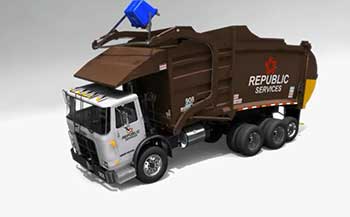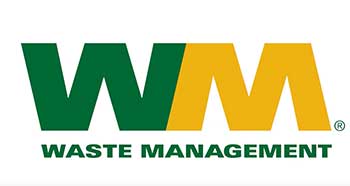When it comes to handling America’s waste, two companies stand above the rest – Republic Services and Waste Management. As the largest waste management companies in the US, Republic Services and Waste Management provide trash and recycling services to millions of residential, commercial and industrial customers across North America.
But how exactly do these waste management giants compare? In this comprehensive guide, we’ll analyze the key differences between Republic Services and Waste Management to help you determine which company may be better suited to handle your waste needs.
A Brief Comparison Table
| Particulars | Republic Services | Waste Management |
| Headquarters | Phoenix, AZ | Houston, TX |
| Year Founded | 1996 | 1968 |
| States Served | 40 | 48 in US and Canada |
| Customers Served | Over 15 million | Over 21 million |
| Revenue (2021) | $11.3 billion | $17.9 billion |
| Landfills Operated | 195 active | 250 active |
| Collection Trucks | Over 16,000 | Over 25,000 |
| Recycling Centers | 71 | 90 material recovery facilities |
| Market Share | 18% | 30% |
| Key Offerings | Solid waste collection, recycling, landfill, sustainability services | Solid waste, recycling, landfills, sustainability, waste-to-energy |
| National Accounts | Smaller base | Large base of 25%+ revenue |
| Sustainability Goals | 35% GHG reduction by 2030 | 40% GHG reduction by 2035 |
Overview Of Republic Services
Founded in 1996 and headquartered in Phoenix, Arizona, Republic Services provides solid waste collection, recycling, disposal and energy services. The company operates across 40 states and Puerto Rico, serving over 15 million customers – more than any other provider.
Some key facts about Republic Services:

- Services include solid waste collection, recycling processing, transfer station services, landfill disposal, and energy services for sustainable waste practices.
- Operates 343 collection operations, 211 transfer stations, 195 active landfills, 71 recycling centers, 6 treatment, recovery and disposal facilities.
- Employs over 35,000 employees and operates over 16,000 waste collection trucks.
- Generated $11.3 billion in revenue in 2021.
- Handles over 115,000 tons of waste and recyclables per day.
- Prioritizes sustainability – produced enough energy to power 1 million homes from landfill gas in 2020.
Overview Of Waste Management
Founded in 1968 and headquartered in Houston, Texas, Waste Management is North America’s leading provider of comprehensive waste management services. The company operates across the US and Canada, serving over 21 million customers.

Key facts about Waste Management:
- Offers collection, landfill, recycling, and environmental services for municipal, commercial and industrial customers.
- Operates over 250 active landfills, 300 transfer stations, 90 material recovery facilities, 16 waste-to-energy plants.
- Employs over 45,000 employees and operates over 25,000 collection and disposal vehicles.
- Generated $17.9 billion in revenue in 2021.
- Handles over 50 million tons of waste and recyclables per year.
- Focused on sustainability – manages over 700,000 tons of recyclables per year.
Also Read: Comparison Between Zep Clog Attack Vs. Drano
Comparing Coverage And Market Share
In terms of coverage area, Republic Services has a presence in 40 states while Waste Management operates in 48 states across the US and Canada. However, when it comes to market share for solid waste services, Waste Management is the clear leader.
Waste Management captures about 30% market share in the US solid waste industry. Republic Services holds the second position with around 18% market share. The rest of the market is divided amongst small private and municipal waste operators.
Both companies are continuously expanding their reach. Republic Services has grown through strategic acquisitions of various regional providers. Waste Management is also actively acquiring smaller companies to extend its footprint.
Range Of Waste Management Services
Republic Services and Waste Management both provide the full spectrum of environmental services related to waste handling. This includes:
- Solid waste collection: Front-end curbside collection of municipal solid waste from residential, commercial and industrial customers.
- Recycling services: Curbside collection and processing of recyclables such as paper, plastic, glass and electronics.
- Hazardous waste management: Safe transportation and disposal of hazardous and regulated waste.
- Landfill disposal: Environmentally safe confinement of waste in sanitary landfills.
- Waste transfer: Consolidating and transporting waste from collection trucks to landfill sites and recycling centers.
- Energy services: Converting landfill gas into renewable energy and providing sustainable waste solutions.
While their core offerings are similar, some differences exist in specific services:
- Republic Services operates more landfills while Waste Management has a larger fleet of natural gas trucks.
- Waste Management owns more waste-to-energy plants that convert waste to electricity.
- Republic Services is more focused on growing its small-container automated collection business.
Also Read: Choose Between ServiceMaster And ServPro.
Customer Base And Pricing
Both Waste Management and Republic Services cater to municipal, commercial and industrial customers. However, Waste Management has a larger base of large national account customers.
For small businesses and residential households, pricing is very competitive between the two. Rates depend on frequency of service, container sizes, waste volume and equipment required. On average, a small business can expect to pay $50-$150 per month while households pay $20-$40 per month.
For large multi-site customers, both companies provide customized solutions and competitive pricing. National accounts make up over 25% of revenue for Waste Management.
Financial Performance
In terms of revenue and profits, Waste Management is significantly larger than Republic Services.
Key Financial Metrics (2021)
| Particulars | Waste Management | Republic Services |
| Revenue | $17.9 billion | $11.3 billion |
| Net Income | $1.8 billion | $1.3 billion |
| Operating Margin | 16.5% | 28.8% |
While Republic Services earns lower revenue overall, its operating margin is significantly higher at 28.8% compared to Waste Management’s 16.5%. This indicates Republic Services operates more efficiently.
Both companies expect continued growth driven by acquisitions, price increases and improved customer retention.
Approaches To Sustainability
Republic Services and Waste Management are industry leaders when it comes to sustainable waste practices. Both have set ambitious sustainability goals:
Republic Services Goals
- Reduce greenhouse gas emissions 35% by 2030
- Increase recovery of key recyclables by 40% by 2030
- Generate enough renewable energy to power 100% of facilities by 2030
Waste Management Goals
- Achieve 40% greenhouse gas reduction by 2035
- Reach 50% recycling rate for operational waste by 2038
- Invest in renewable natural gas and battery-electric trucks
By innovating operations, converting waste to energy, and enabling recycling, both companies are driving positive environmental change.
Also Read: Choose Between Zoom Drain And Roto-Rooter.
Frequently Asked Questions (FAQ)
No, Waste Management and Republic Services are two distinct companies. They are the largest waste management providers in the US and compete for market share.
No, there has been no acquisition or merger between Waste Management and Republic Services. They continue to operate as separate independent companies.
Yes, Republic Services is Waste Management’s biggest competitor. Other large competitors include Clean Harbors, Stericycle and Progressive Waste Solutions. Small regional providers also compete in local markets.
Waste Management has the largest market share at around 30% of the US solid waste industry. Republic Services is second with around 18% national market share. The rest of the market is fragmented between small private and municipal operators.
Also watch the video!
The Verdict
When choosing between Republic Services and Waste Management, there are few key factors to consider:
- Service coverage – Ensure the provider services your location or has capabilities to expand.
- Pricing – Obtain quotes from both as pricing is competitive. Negotiate for bundled solutions.
- Customer service – Assess responsiveness and service quality before deciding.
- Sustainability – Pick the provider whose sustainability agenda best aligns with your organization.
- Safety record – Review safety practices, training and track record. Safety should be a top priority.
- Smart technology – Opt for the provider employing latest waste optimization technology such as sensors, routing software, and automated collection.
For large multi-location customers, Waste Management may be better positioned to provide national account management. Small businesses and households are well served by both providers. Use this analysis to make an informed waste partner selection.
